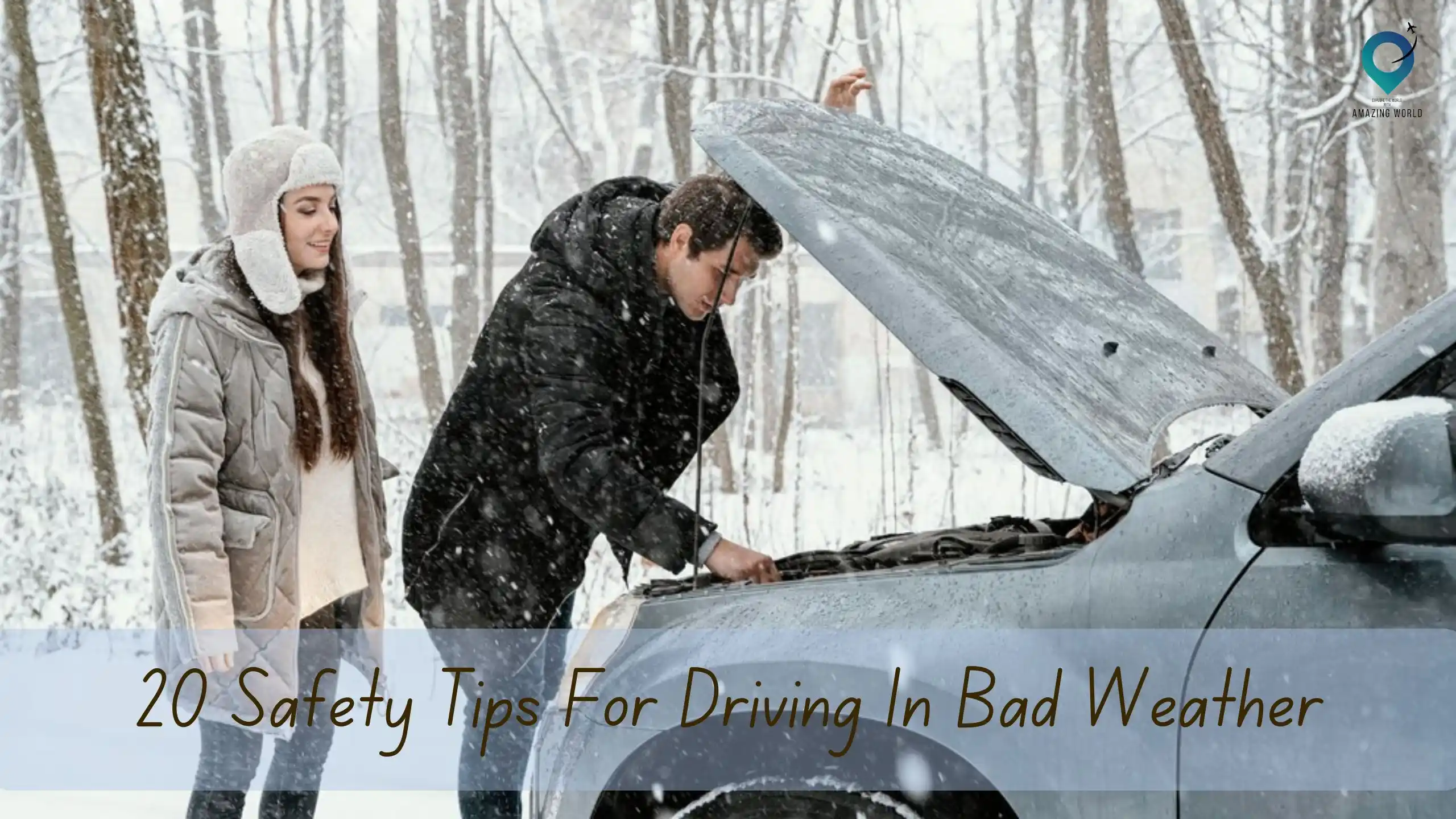30 Tips: How to Handle Road Trip Mishaps and Unexpected Detours
Table of Contents
Toggle
Are you ready to hit the open road and embark on an unforgettable adventure? Planning a road trip is an exhilarating experience, filled with anticipation and excitement. But let’s face it – sometimes things don’t go according to plan. Road trip mishaps and unexpected detours can throw a curveball into your journey. That’s why we’ve created the ultimate guide to help you handle these challenges like a pro.
In this comprehensive guide, we’ll provide you with 30 invaluable tips on how to handle road trip mishaps and unexpected detours, ensuring that your travel plans stay on track. From planning your route to staying updated with real-time traffic information, we’ve got you covered. So buckle up, adjust your rearview mirror, and let’s dive into the essential strategies for a smooth and stress-free road trip.
1. Planning your route and alternatives
Before embarking on your road trip, plan your route thoroughly. Use online maps and navigation apps to identify the best route. Additionally, consider alternative routes in case of road closures or heavy traffic.
2. Considering weather conditions
Check the weather conditions along your route and adjust your plans accordingly. If severe weather is expected, such as heavy rain or snowstorms, consider postponing your trip or taking a different route to ensure your safety.
3. Roadside emergency kit
Always keep a roadside emergency kit in your vehicle. It should include essentials such as a first aid kit, flashlight, jumper cables, spare tire, jack, and a toolkit. Being prepared for unexpected breakdowns or minor accidents can save you time and stress.
4. Reliable GPS or navigation system
Invest in a reliable GPS or navigation system to navigate unfamiliar roads confidently. These devices can provide real-time directions and help you find alternative routes in case of detours or road closures.
5. Staying updated with traffic and road conditions
Stay updated with traffic and road conditions using apps or websites that provide real-time information. This will help you avoid congested areas, accidents, or road construction, enabling you to choose the best possible route.
6. Taking breaks and avoiding fatigue
During long drives, it’s essential to take breaks and rest when needed to avoid fatigue. Driver fatigue can impair your judgment and reaction time, increasing the risk of accidents. Take short breaks every few hours, stretch your legs, and grab a snack or a cup of coffee to stay alert and refreshed.
7. Packing essential supplies
Pack essential supplies to ensure a comfortable and safe journey. Include items like water, snacks, a basic toolkit, a spare tire, a car jack, and jumper cables. These supplies can come in handy in case of emergencies or unexpected situations.
8. Vehicle inspection before the trip
Before hitting the road, inspect your vehicle thoroughly to minimize the chances of breakdowns. Check the tires, brakes, lights, fluids, and ensure that everything is in proper working condition. It’s better to address any issues beforehand rather than dealing with them during your trip.
9. Staying alert and avoiding distractions
When driving, it’s crucial to stay focused and avoid distractions. Keep your phone on silent or use hands-free devices for calls. Avoid texting, eating, or any other activities that may divert your attention from the road. Your full attention should be on driving and ensuring your safety.
10. Following road signs and traffic rules
Follow road signs and obey traffic rules at all times. They provide important information and guidance to ensure a smooth and safe journey. Adhering to speed limits, traffic signals, and other regulations is essential for your safety and the safety of others on the road.
11. Dealing with detours
If you encounter a detour or a road closure, it’s important to stay calm and follow the instructions provided by traffic authorities. Detours are temporary inconveniences, and by following the designated alternative routes, you’ll be back on track in no time.
12. Maintaining a calm and positive attitude
Stressful situations can arise during a road trip, but it’s crucial to maintain a calm and positive attitude. Remember that mishaps and detours are part of the adventure. Stay patient, focus on finding solutions, and keep a positive mindset to overcome any challenges that come your way.
13. Effective communication with travel companions
When traveling with others, effective communication is key to making collective decisions. Discuss plans, share responsibilities, and consider everyone’s input. Good communication ensures that everyone is on the same page and reduces misunderstandings or conflicts along the way.
14. Utilizing rest stops and visitor centers
Make use of rest stops and visitor centers along your route. They provide valuable information about the area, including local attractions, amenities, and road conditions. Take breaks at these stops to stretch your legs, use the facilities, and gather any necessary information.
15. Keeping important contact numbers
Before your trip, make a list of important contact numbers, including emergency services, roadside assistance, your accommodation, and your destination’s tourist information center. Having these numbers easily accessible can be helpful in case of emergencies or if you need assistance.
16. Travel insurance for unforeseen events
Consider getting travel insurance that covers road trips. Travel insurance can provide coverage for unexpected events such as accidents, trip cancellations, medical emergencies, or vehicle breakdowns. Knowing that you’re financially protected during unforeseen circumstances offers peace of mind.
17. Researching nearby accommodations and amenities
If your road trip involves overnight stays, research nearby accommodations and amenities in advance. Make reservations whenever possible to ensure availability. Knowing where you can rest, eat, and refuel along your route can save you time and prevent unnecessary stress.
18. Utilizing online maps and navigation apps
Online maps and navigation apps are invaluable tools for real-time updates on road conditions, traffic congestion, and alternative routes. Use them to stay informed and make informed decisions during your road trip. These apps can provide live traffic information, estimated travel times, and suggest the best routes based on current conditions.
19. Staying connected with family and friends
During your road trip, it’s important to stay connected with family and friends. Let them know your itinerary, share updates on your progress, and inform them about any changes or delays. Regular communication ensures that someone is aware of your whereabouts and can provide assistance if needed.
20. Carrying cash and spare change
Keep some cash and spare change handy during your road trip. You may encounter toll roads, parking fees, or situations where card payments are not accepted. Having cash readily available will save you from any inconvenience or delays.
21. Ensuring safety in unfamiliar areas
When exploring unfamiliar areas, prioritize your safety. Park in well-lit areas, lock your vehicle when unattended, and avoid isolated or unsafe locations. Trust your instincts and be cautious of your surroundings. If something feels off, it’s better to err on the side of caution.
22. Prioritizing personal safety and instincts
Your personal safety should always be a priority. If you feel uncomfortable or unsafe in any situation, trust your instincts and take necessary precautions. Whether it’s avoiding hitchhikers or finding a well-populated area for assistance, prioritize your well-being above all else.
23. Maintaining a well-maintained fuel tank
To avoid any unforeseen fuel-related issues, ensure that your vehicle’s fuel tank is well-maintained and filled up before starting your road trip. Keep an eye on fuel levels during your journey and refuel when necessary. Running out of fuel in the middle of nowhere can lead to unnecessary complications.
24. Staying updated with local news
Stay updated with local news and weather reports during your road trip. This will help you anticipate any road closures, severe weather conditions, or other local events that might affect your travel plans. Being aware of the current situation in the areas you’re passing through is essential for a smooth journey.
25. Basic car troubleshooting techniques
Learning basic car troubleshooting techniques to handle minor issues that may arise during your road trip is beneficial. Familiarize yourself with tasks such as changing a flat tire, jump-starting a battery, or checking fluid levels. This knowledge can save you time and money, allowing you to continue your journey without major disruptions.
26. Having a backup plan for major breakdowns
While you hope for a trouble-free trip, it’s wise to have a backup plan in case of major vehicle breakdowns. Research nearby mechanics or towing services along your route, and have their contact information readily available. This way, you’ll be prepared to take action promptly if a significant mechanical issue occurs.
27. Practicing road etiquette and courtesy
Good road etiquette and courtesy go a long way in ensuring a pleasant and safe journey. Be considerate of other drivers, use your signals when changing lanes, maintain a safe distance from other vehicles, and yield to pedestrians or emergency vehicles. Respecting and following road etiquette enhances the overall road trip experience for everyone.
28. Documenting your journey
Capture the moments and create lasting memories by documenting your road trip. Take photos, jot down notes, and document interesting experiences along the way. This allows you to relive the adventure later and share your experiences with others.
29. Taking advantage of travel technology
Make the most of travel technology during your road trip. There are countless apps available for language translation, local recommendations, finding nearby attractions, and even suggesting the best places to eat. Embrace the convenience of technology to enhance your road trip experience.
30. Learning from mishaps and detours
Road trip mishaps and unexpected detours can be valuable learning experiences. Instead of letting them ruin your trip, embrace them as opportunities for growth and improvement. Reflect on what went wrong, how you handled the situation, and what you could do differently next time. By learning from these experiences, you’ll be better prepared for future road trips and able to handle challenges with confidence.
Conclusion
Embarking on a road trip is an exciting adventure, but it’s important to be prepared for the unexpected. By following these 30 tips, you’ll be equipped to handle road trip mishaps and unexpected detours effectively.
From planning your route and staying alert to utilizing technology and prioritizing safety, these strategies will ensure a smooth and enjoyable journey. Remember to stay positive, adapt to changing circumstances, and make the most of every moment on the road.
How much did you like Our detailed 30 Tips: How to Handle Road Trip Mishaps and Unexpected Detours? Review Also, please share these Blogs with your friends on social media.
Related Article –
- Road Trips Ideas | 12 Tips to Prepare Your Car for a Long Road Trip?
- 150 Best Places to Visit in the United States In 2023
- Road Trip With Kids
- How to Stay Awake While Driving Long Distances
- Audiobooks to Listen to On Your Road Trip
- How to Create an Epic Itinerary Road Trip
Road Trip Mishaps FAQs
What should I do if I encounter a road closure?
If you encounter a road closure, follow the instructions provided by traffic authorities. They will guide you to the designated alternative routes. Stay calm and patient, and trust the instructions provided to ensure a safe detour.
How do I handle a car breakdown in an unfamiliar area?
If your car breaks down in an unfamiliar area, prioritize your safety. Pull over to a safe location if possible, turn on your hazard lights, and assess the situation. If you can’t resolve the issue yourself, call for roadside assistance or a towing service. Use your phone or a navigation app to find nearby mechanics who can help.
Is it necessary to have travel insurance for a road trip?
While travel insurance is not mandatory, it is highly recommended for road trips. Travel insurance provides coverage for unforeseen events such as accidents, trip cancellations, medical emergencies, or vehicle breakdowns. It offers financial protection and peace of mind during your journey.
How can I stay updated with real-time traffic information?
To stay updated with real-time traffic information, use apps or websites that provide live traffic updates. Popular navigation apps like Google Maps, Waze, or Apple Maps offer real-time traffic data, alternative routes, and estimated travel times. Additionally, local traffic authority websites or radio stations may provide traffic updates for specific regions.
What are some common road trip mishaps to be aware of?
Common road trip mishaps include car breakdowns, flat tires, accidents, traffic congestion, road closures, adverse weather conditions, and getting lost. Being prepared for these situations by following the tips mentioned in this article will help you handle them effectively and minimize their impact on your trip.

Meet David Hoper, a passionate travel Blog writer with 7+ years of experience in travel content. Through his exemplary storytelling and engaging narratives, he shares his experiences and brings destinations to life. With a keen eye for detail and a love for exploration, he has cultivated a diverse portfolio of travel blogs that inspire and inform readers worldwide.








